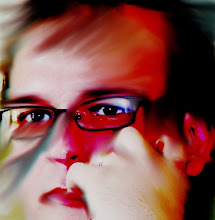
Here's my video review of David Michôd's "Animal Kingdom."
It's an unbelievably brilliant crime drama that deservedly won the International Grand Jury at Sundance this Spring.
If you're here to see how many stars or thumbs I'm going to give the latest release, you're on the wrong page, my friend. This site is dedicated to the analysis of films, new and old, celebrated and obscure. My latest entry is as likely to be about a forty-year-old film you've never heard of as a review of the latest big blockbuster. Are you dying to read my superior, film-snob opinion on any particular films? Just ask.


 His childhood was lonely, so how could a film about his life be so excruciatingly tedious to sit through?
His childhood was lonely, so how could a film about his life be so excruciatingly tedious to sit through? Boring young lust.
Boring young lust. Aaron Johnson, who plays Lennon, sleepwalks through the entire film and he looks like he’s just about as bored as all of us are.
Aaron Johnson, who plays Lennon, sleepwalks through the entire film and he looks like he’s just about as bored as all of us are. “Nowhere Boy” drags on for 45 minutes or so with no mercy killing in sight until finally John’s aunt buys him a guitar.
“Nowhere Boy” drags on for 45 minutes or so with no mercy killing in sight until finally John’s aunt buys him a guitar.

 Better yet, just go and listen to "Imagine" or "Double Fantasy."
Better yet, just go and listen to "Imagine" or "Double Fantasy." “Grace” is Paul Solet’s feature film debut. Solet, isn’t someone you’ve heard of iunless you’re just the most obsessive horror movie fan in the universe, or maybe one of his friends or something.
“Grace” is Paul Solet’s feature film debut. Solet, isn’t someone you’ve heard of iunless you’re just the most obsessive horror movie fan in the universe, or maybe one of his friends or something. But that’s not even the best part. Neither the blood-sucking baby nor the mother who supplies the infant with God’s yummy, red innards-nectar is the creepiest character in the movie.
But that’s not even the best part. Neither the blood-sucking baby nor the mother who supplies the infant with God’s yummy, red innards-nectar is the creepiest character in the movie.
 Then there’s the mother.
Then there’s the mother.  Then you have the just unbelievably insane grandmother who’s determined to make herself start lactating again so she can feed her grand-baby, but oh my God, she has no idea what she’s getting into.
Then you have the just unbelievably insane grandmother who’s determined to make herself start lactating again so she can feed her grand-baby, but oh my God, she has no idea what she’s getting into. Solet doesn’t come near the level of Cronenberg when it comes to examining just what our relationships to these bizarre things we call bodies are. But that is a high watermark.
Solet doesn’t come near the level of Cronenberg when it comes to examining just what our relationships to these bizarre things we call bodies are. But that is a high watermark.

 |
| Photo Courtesy: Warner Bros. Pictures |
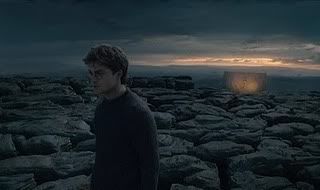
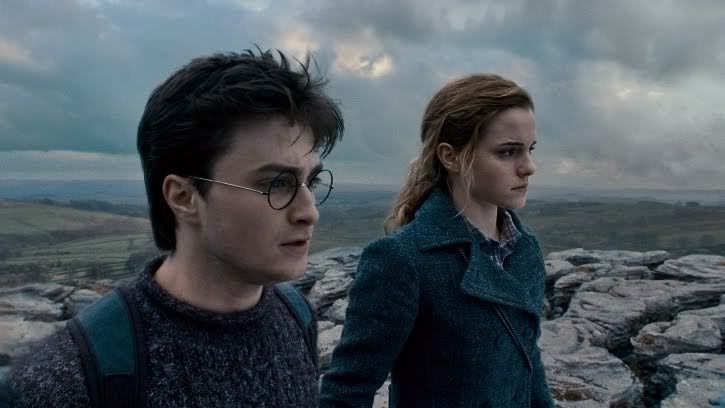
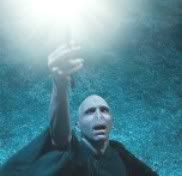 Almost every other movie a major studio cranks out takes the opposite approach where the story is there as a flimsy justification for showcasing whatever cool effects the audience wants to be wowed by. In “Harry Potter and the Deathly Hallows,” the story, character development and emotional impact of the film are already a solid foundation for everything else to dance on.
Almost every other movie a major studio cranks out takes the opposite approach where the story is there as a flimsy justification for showcasing whatever cool effects the audience wants to be wowed by. In “Harry Potter and the Deathly Hallows,” the story, character development and emotional impact of the film are already a solid foundation for everything else to dance on.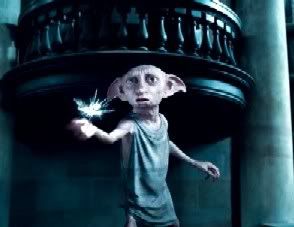 Even without any effects or even magic, we’d be left with an exceptionally compelling drama with absorbing and conflicted characters. The animation and effects come in and serve the story instead of being the superfluous eye-candy audiences have become used to. It might sound like a contradiction to rejoice in how masterfully the animation was used in a film by saying that it wasn’t essential, but that’s just how carefully the effects are woven into this story.
Even without any effects or even magic, we’d be left with an exceptionally compelling drama with absorbing and conflicted characters. The animation and effects come in and serve the story instead of being the superfluous eye-candy audiences have become used to. It might sound like a contradiction to rejoice in how masterfully the animation was used in a film by saying that it wasn’t essential, but that’s just how carefully the effects are woven into this story. This is Serra’s first Harry Potter film and it’s clear he was picked precisely because he’s not an effects-driven cinematographer. Serra is known for creating stunning pictures with very little backdrop, working with filmmakers like Claude Chabrol, Patrice Leconte, and Ian Softley. And that’s why, when the animation is brought in, it has so much power. When we see an effect, it’s for a reason, in “Deathly Hallows,” often to express the rage or despair of one of the characters.
This is Serra’s first Harry Potter film and it’s clear he was picked precisely because he’s not an effects-driven cinematographer. Serra is known for creating stunning pictures with very little backdrop, working with filmmakers like Claude Chabrol, Patrice Leconte, and Ian Softley. And that’s why, when the animation is brought in, it has so much power. When we see an effect, it’s for a reason, in “Deathly Hallows,” often to express the rage or despair of one of the characters.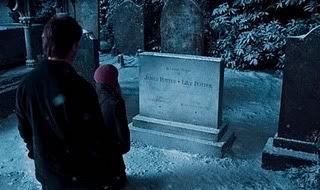 It’s the perfect example of animation, and imagination being used to convey the most sincere emotion. It parallels the way in the wizarding world the way magic can be used to express the most profound sorrow, joy or comfort.
It’s the perfect example of animation, and imagination being used to convey the most sincere emotion. It parallels the way in the wizarding world the way magic can be used to express the most profound sorrow, joy or comfort.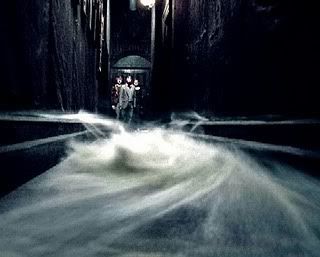 In another effects-driven, Harry and Ron destroy a Horcrux. (If you’re not a Potter fan and don’t know what that is, I’m not going to spend a lot of time explaining it to you. It’s an enchanted locket. There.) What comes out of the cursed object is Ron Weasley’s worst fears and deepest insecurities expressed through a wonderfully dismal and frightening animated sequence.
In another effects-driven, Harry and Ron destroy a Horcrux. (If you’re not a Potter fan and don’t know what that is, I’m not going to spend a lot of time explaining it to you. It’s an enchanted locket. There.) What comes out of the cursed object is Ron Weasley’s worst fears and deepest insecurities expressed through a wonderfully dismal and frightening animated sequence.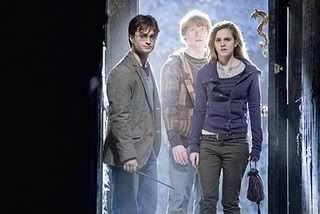 This cartoon alone is worth the price of admission, but really, the entire movie is simply wonderful. There is sadness and a joy in every look, touch and tone of voice when these three lifelong friends have any sort of exchange. The characters and the films have so many layers now, the storytelling is so rich that, visual effects aside, “Deathly Hallows” is just an incredible film.
This cartoon alone is worth the price of admission, but really, the entire movie is simply wonderful. There is sadness and a joy in every look, touch and tone of voice when these three lifelong friends have any sort of exchange. The characters and the films have so many layers now, the storytelling is so rich that, visual effects aside, “Deathly Hallows” is just an incredible film.
 "The Girl Who Kicked the Hornet's Nest" does lack the bite of "The Girl With the Dragon Tattoo," but it's a more than fitting end to the Millennium Trilogy.
"The Girl Who Kicked the Hornet's Nest" does lack the bite of "The Girl With the Dragon Tattoo," but it's a more than fitting end to the Millennium Trilogy.
 He is admitted and put into the adult psychiatric ward because the teen ward is under renovations.
He is admitted and put into the adult psychiatric ward because the teen ward is under renovations. He befriends Bobby, a guy who is hesitant to open up and tell Craig what his problems are, and is instantly attracted to Noël, another teen stuck in the adult wing.
He befriends Bobby, a guy who is hesitant to open up and tell Craig what his problems are, and is instantly attracted to Noël, another teen stuck in the adult wing.





Now that I’ve seen the film, I have to say anyone who found it gloomy probably just didn’t get it.
Clint Eastwood isn’t a filmmaker who shies away from death and “Hereafter” opens with a sequence that kicks you right in the face.
What’s disquieting about the scene isn’t its realism.
It’s how we follow Maria, a French journalist, played by “High Tension’s” Cecile de France, from the moment she realizes she’s in danger right up to her death.

As audiences, we’re used to seeing the carnage from a survivor’s point of view.
We watch other people go down, sometimes in horrific ways, with casual indifference.
As someone who unabashedly loves screen violence, I was surprised at how disturbed I was seeing this woman die.
We’re not used to seeing death from the victim’s point of view and this scene starts “Hereafter” on just the right note for Eastwood to ask his viewers to think very seriously about death.
When we experience death through the eyes of this woman, we know this isn’t going to be a thriller.
This film is going to be a meditation on the very nature of mortality and Eastwood takes the theme on just as seriously as he did with “Million Dollar Baby” and “Unforgiven.”
In the hands of a less capable storyteller, “Hereafter” might have been a contrived film. When I heard about the plot, it didn’t sound like something that would normally draw me in.
But after “
“Hereafter” centers around three people, all dealing with their brushes with death or grief in different ways.
First, there’s the story of Marie, the French journalist who died in the Tsunami and then came back to life, after seeing what lies after death.
She’s burning to tell the world what she’s seen and explore, as a writer, the scientific community’s studies on the subject of life after death.
Of course, this doesn’t do wonders for her career.
Then, there’s Marcus, a little boy in
He runs into all sorts of charlatans in a sadly funny sequence. We want to laugh at how ridiculous these people are, but then we see the disappointment on this kid’s face when they turn out to be frauds.
There’s one scene where Marcus goes into a group reading where a woman is on stage doing the John Edwards tricks. She goes across the crowd saying things like, “I’m feeling that someone here has lost someone,” and “I’m sensing a name that starts with ‘J.’”

George doesn’t mess around with any of this, “I’m sensing some vague who-the-hell-can-guess-what.” He knows exactly who he’s talking to and he hears them clearly.
Unfortunately, this ability is a burden. When George meets Melanie, a lovely young woman at a cooking class, played by Bryce Dallas Howard, there is instant chemistry between them.
Then, she finds out he has this gift and she asks him to do a reading. He all but begs her to let him off the hook, assuring her that once that happens, the chances their relationship will go anywhere will go down significantly.
Of course, she doesn’t listen and he gives in.
 And we’re not surprised to see that she doesn’t show up the next week for cooking class.
And we’re not surprised to see that she doesn’t show up the next week for cooking class.

Clint Eastwood takes his time telling each story and treats each character with the care they deserve. When the paths of these three finally intersect, it doesn’t feel forced or artificial.
“Hereafter” has been marketed as a thriller, but it’s not.
It is an extremely gentle, if sometimes unsettling drama and it stands up with “Million Dollar Baby” and “Unforgiven” as Eastwood once again asks his audience to look death right in the face.

Because it’s being marketed as a genre picture, “Hereafter” will probably join “Gran Torino” as one of his recent films totally shut out as far as Oscar nods go and that’s a shame.
Just go see it.
